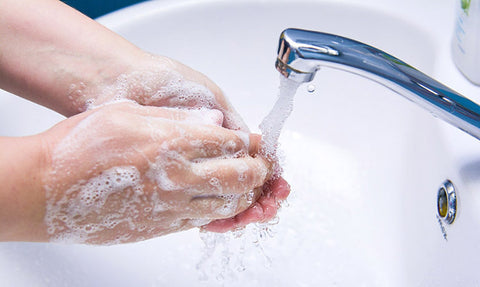Why you shouldn't be using antibacterial soap January 23 2022

One of the troubling issues that has come about since Covid-19 came onto the scene is the resurgence of the use of antibacterial soaps.
In our overzealousness to attempt to avoid contracting the virus, many have forgotten that, just as antibiotics do not kill viruses, antibacterial soaps are not useful, and can do more harm than good. In fact, on September 2, 2016, the FDA banned 19 supposedly antibacterial additives commonly found in over-the-counter soaps. So why has the FDA decided to prohibit these seemingly helpful additives?
To fully understand the FDA’s ruling, we should first understand a little about how soaps clean and disinfect. A quick chemistry refresher will remind us that there are two general types of molecules: polar (things that can be mixed into water, like sugar) and nonpolar (things that cannot be mixed into water, like oil).
Soap molecules are amphipathic, meaning they have both polar and non-polar properties. This gives soap the ability to dissolve most types of molecules, making it easier to wash them off your hands. In terms of illness-causing germs, which are mostly bacteria and viruses, soap has a two-fold effect: one chemical and one behavioral. Firstly, the amphipathic nature of soap loosens the bacteria and viruses off your hands so they can be washed away more easily. Secondly, you tend to wash your hands for a longer period when using soap, because you try to rinse all of it away. Thus, regular soaps don’t necessarily kill bacteria and viruses as much as they simply help you wash them off your skin.
Antibacterial soaps have all the same properties as regular soap, but with an extra ingredient added that is intended to stop the bacteria remaining on your skin from replicating. The idea is that this additive will further protect the hand-washer from harmful bacteria as compared to regular soap. It is important to mention that these ingredients generally have no effect on viruses, so the focus is to reduce the risk from bacterial germs.
To date, there has been no conclusive evidence to suggest household antibacterial soaps are an improvement over non-antibacterial soaps. In fact, one study found it didn’t matter whether a household used plain or antibacterial soap containing triclocarban, a compound that is closely related to triclosan and is a part of the FDA ban: both cut the incidence of childhood pneumonia and diarrhea in half.
This means that if you are washing your hands with antibacterial soap, you are exposing yourself and the environment to increased amounts of these chemicals without any measurable benefit.
“Handwashing is like a do-it-yourself vaccine,” according to the U.S. Centers for Disease Control. Washing with plain soap and water has been shown to reduce bacterial presence on hands by 82%, and studies upon studies point to the beneficial health impacts of washing with plain soap. Clearly the chemical properties of plain soap and its tendency for increasing handwashing time are enough to dramatically increase the health of consumers without adding antibacterial compounds. So, while the FDA has banned household soaps containing many common antibacterial ingredients, handwashing with plain soap will remain a cornerstone of public health and should continue to be a major part of your daily hygiene.
Here's a breakdown of reasons you SHOULD NOT use antibacterial soaps:
1. Antibacterial soap contributes to the rise of antibiotic-resistant bacteria. Maybe you’ve heard now about how the overuse of antibiotics is causing the rise of antibiotic-resistant “superbugs.” Well, the same can be said of antibacterial products like soap.
2. Antibacterial soap may disrupt hormones. In animal studies, like one done at the Journal of Toxicological Sciences, it was found that triclosan altered the hormones in rats, causing an estrogenic effect. The Food and Drug Administration says that animal studies aren’t always indicative of what will happen to humans, but even they recommend reviewing the risks further and say that concerned consumers should use regular soap instead.
3. Antibacterial soap may impair muscle function. The list of risks associated with triclosan go on! A study, reported in Smithsonian Magazine, found that triclosan “hinders human muscle contractions at the cellular level and inhibits normal muscle functioning in both fish and mice.” The researchers weren’t even exposing cells to super-high dosages during the study. They used levels of triclosan similar to what we experience every day.
4. Antibacterial soap increases risk of allergies. There are a lot of theories about why allergies are on the rise and one is that the overly-sanitized environment that we live in is harming the development of our immune system. A study published in the Journal of Allergy and Clinical Immunology furthers this theory. It found that the triclosan commonly found in antibacterial products causes mutations, which may lead to food allergies.
5. Antibacterial soap is bad for the environment. When you rinse your hands of antibacterial soap, it doesn’t just disappear down the drain. It gets into our environment and could have disastrous consequences. As Eco Watch reported, the antibacterial chemicals in soap aren’t completely removed by wastewater treatment facilities. The chemicals get transferred into sludge, which is then put on agricultural land and could contaminate surface water.
6. Antibacterial soap isn’t any more effective than regular soap. The icing on the cake is that antibacterial soap doesn’t do any better of a job at preventing disease than regular soap.
So please, continue to wash your hands well, but do it with good old regular soap. :-)
